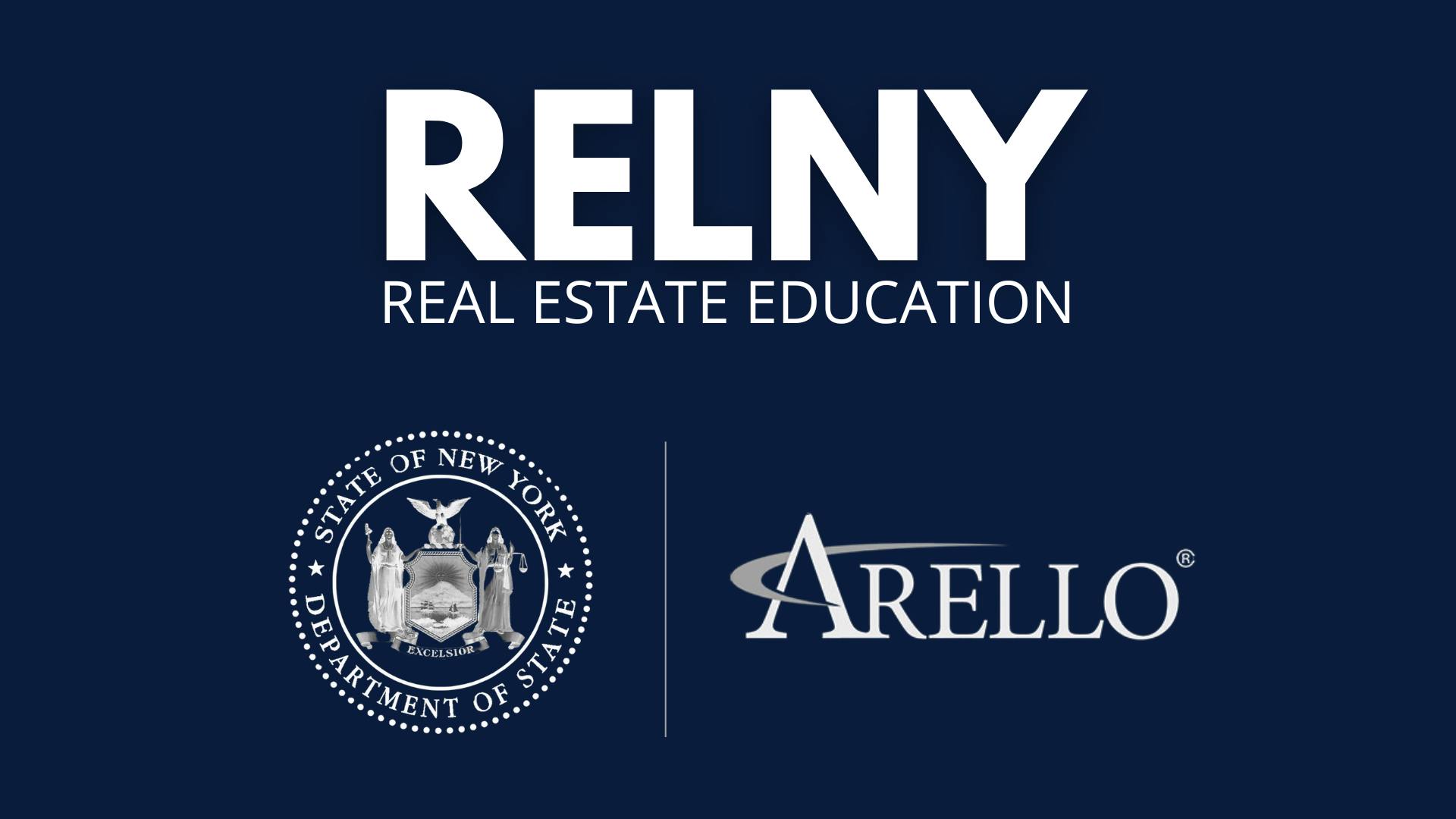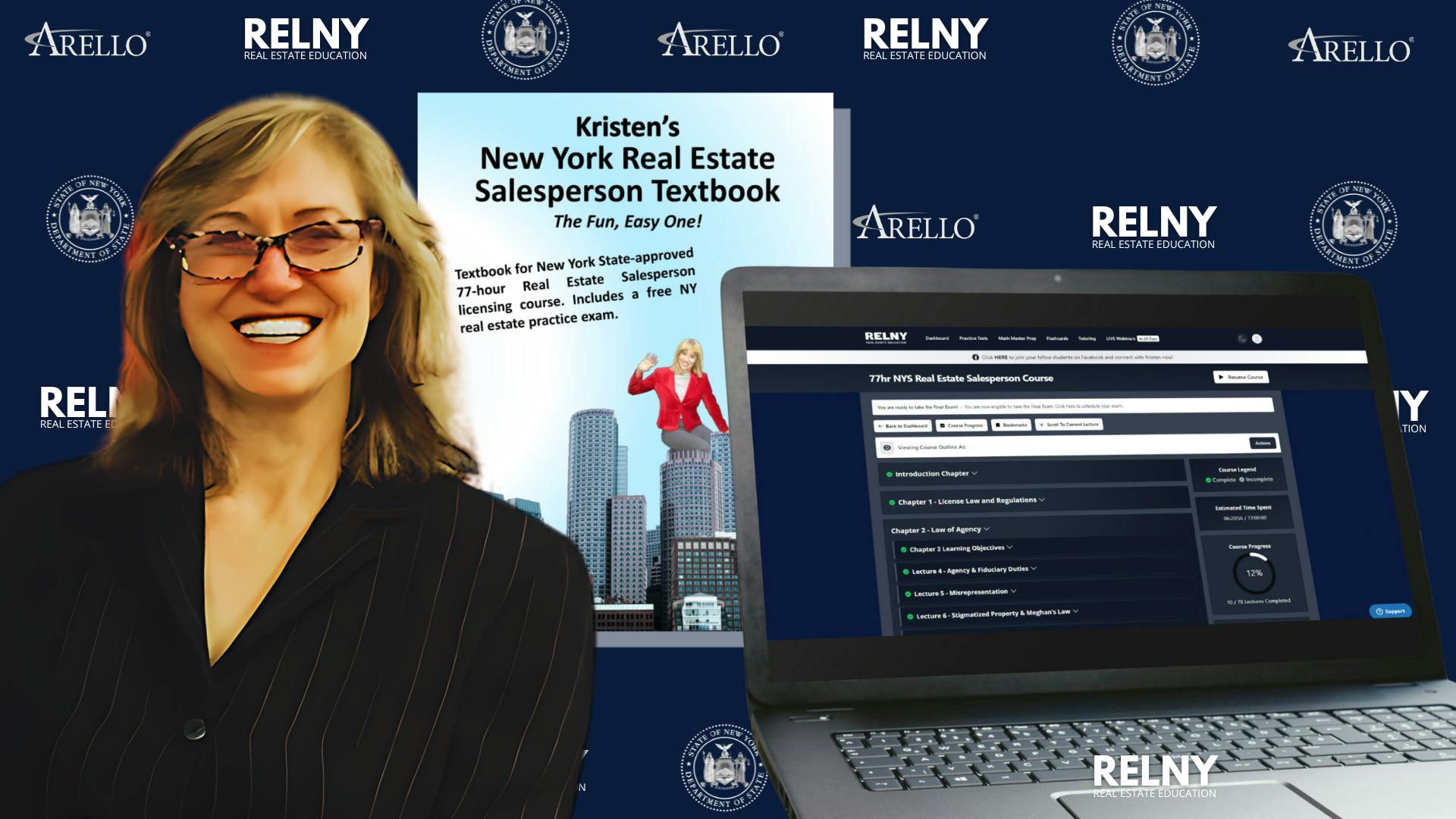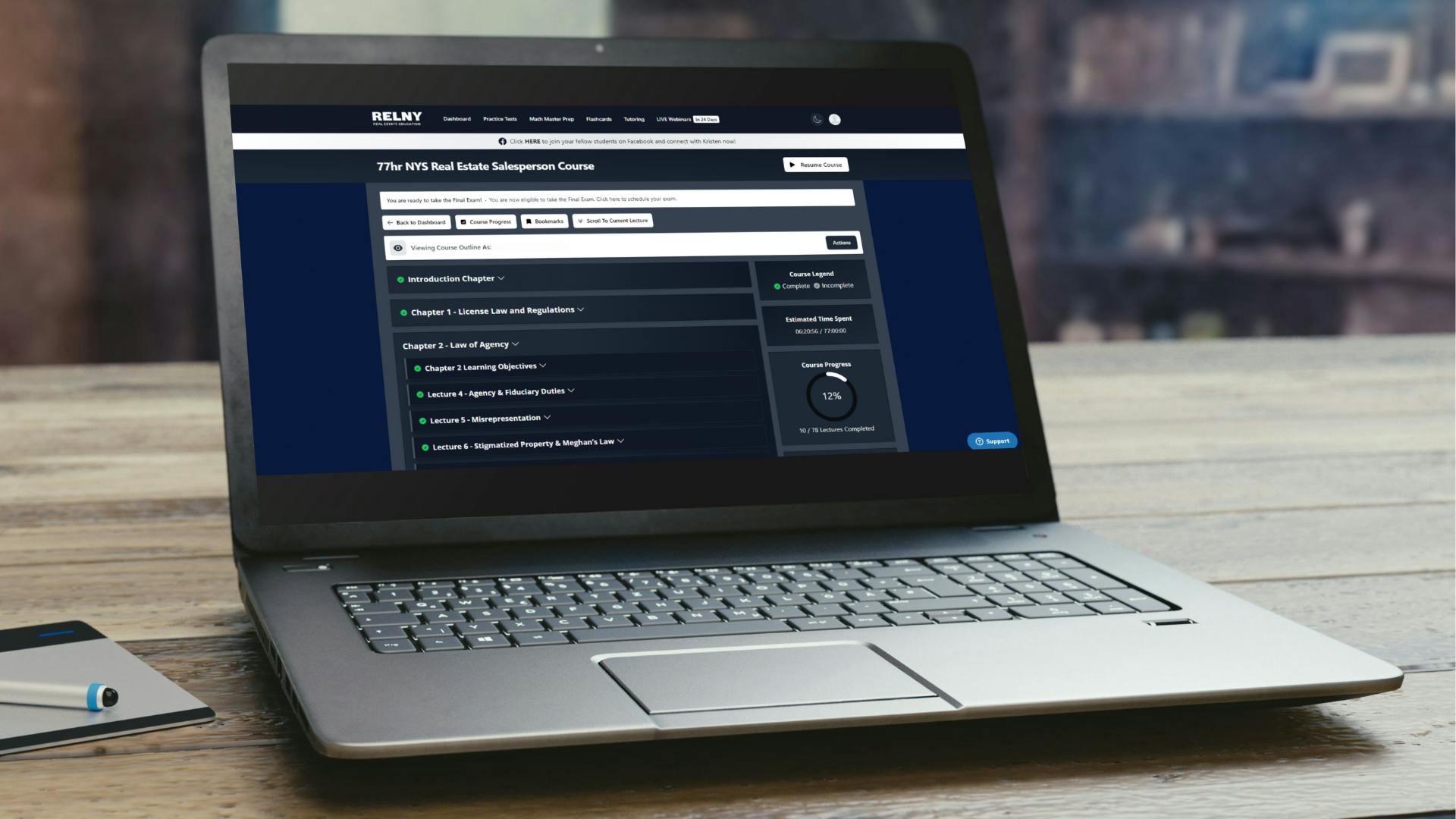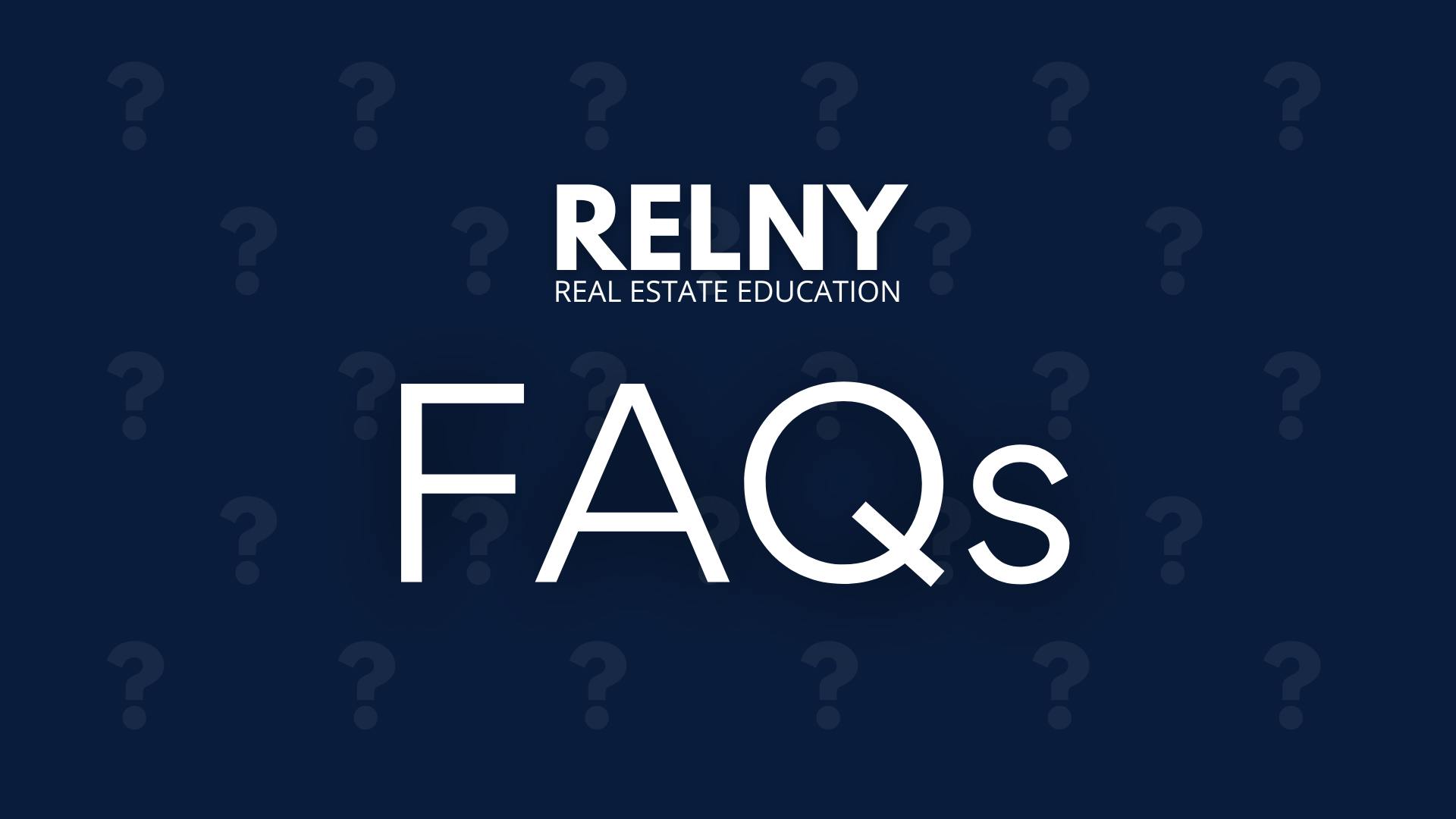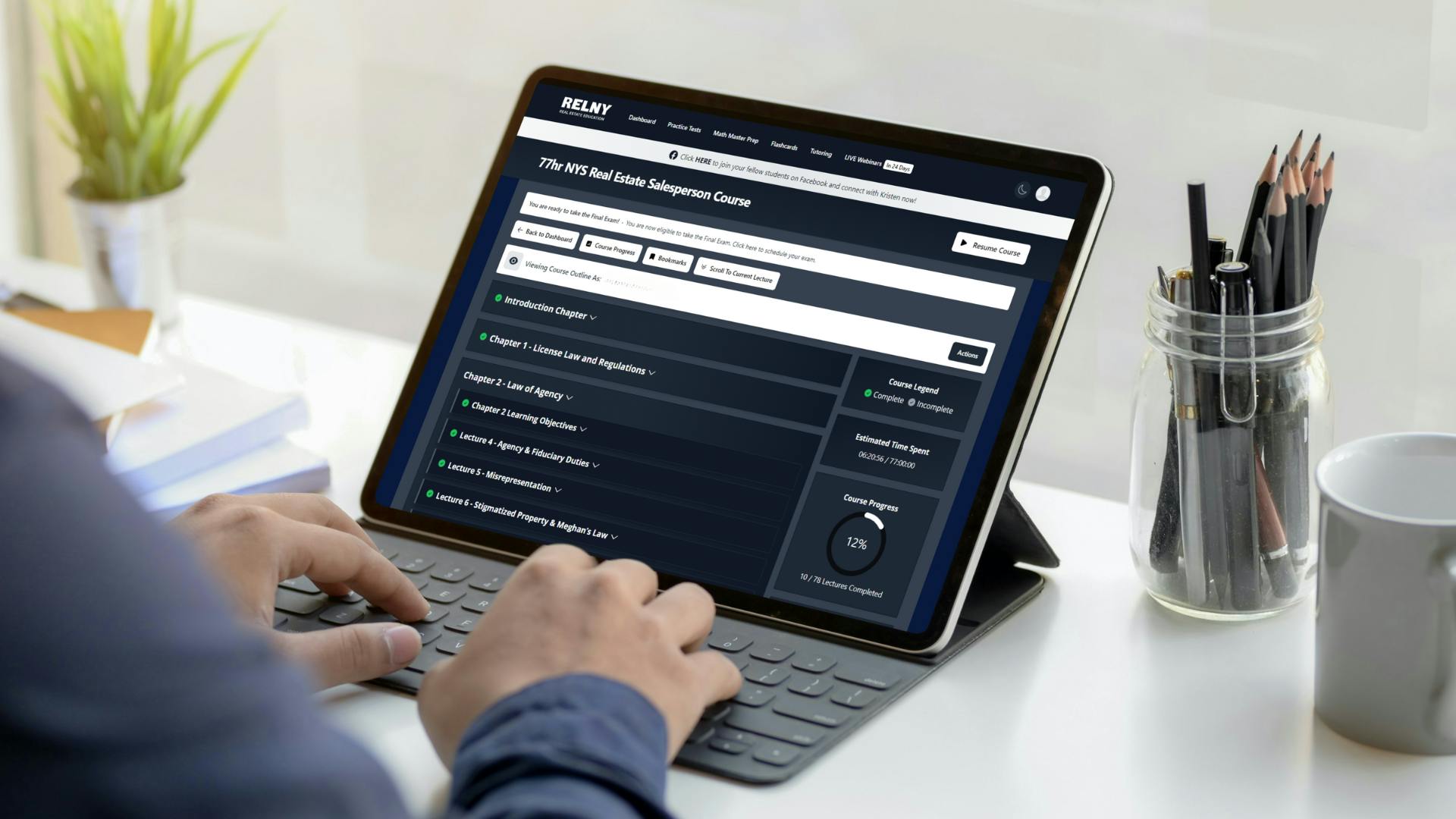What is Real Property? A Key Term for the Real Estate Licensing Exam
Learn About Real Property for the NYS DOS Real Estate Licensing Examination

-
Course Certified & Accredited by NYS DOS & ARELLO®
-
77 Hour NYS Real Estate Salesperson Licensing Course
-
Live Office Hours with Kristen
-
Take Final Exam at Home
-
Kristen's 1:1 Private Tutoring
-
Subtitles/Transcripts for all languages offered by NYS DOS
-
Call/Text (877) 997-3569
What is Real Property? A Key Term for the Real Estate Licensing Exam
When preparing for the New York Real Estate Salesperson Licensing Exam, mastering fundamental concepts like Real Property is essential. At RELNY, we emphasize the importance of understanding such terms, as they form the foundation of real estate law and practice. This article will delve into the concept of Real Property, breaking it down to ensure you’re well-prepared for your licensing exam.
What is Real Property?
Real Property refers to land and any permanent structures attached to it, such as buildings, homes, or other improvements. Unlike personal property, which includes movable items like furniture and cars, real property is immovable. In the context of real estate, understanding the distinction between real and personal property is crucial.
Real Property encompasses not just the physical land, but also the rights associated with owning that land. These rights include:
- Surface Rights
The right to use the surface of the land.
- Subsurface Rights
The rights to natural resources like minerals found below the surface.
- Air Rights
The right to use the space above the land.
Legal Characteristics of Real Property
When discussing real property, it's important to grasp its legal characteristics, which will likely appear on your licensing exam:
- Permanence
Real property is immovable and permanent. This characteristic sets it apart from personal property, which can be relocated.
- Indestructibility
While the structures on the land can be destroyed, the land itself cannot be destroyed. This concept underscores the enduring nature of real property.
- Uniqueness
Every piece of real property is unique due to its specific location. No two parcels of land are exactly alike, making location a critical factor in real estate transactions.
Types of Real Property
In your exam, you might encounter questions about different types of real property. These typically include:
- Residential Property
Land and buildings used for housing, including single-family homes, condominiums, and apartments.
- Commercial Property
Properties used for business purposes, such as office buildings, shopping centers, and hotels.
- Industrial Property
Land and buildings used for industrial activities, including factories, warehouses, and distribution centers.
- Agricultural Property
Land used for farming, including crop production, livestock grazing, and other agricultural activities.
Real Property vs. Personal Property
One of the key distinctions you'll need to understand is the difference between real property and personal property.
- Real Property is immovable and includes land and anything permanently attached to it.
- Personal Property (also known as "chattel") is movable and not permanently attached to the land. Examples include furniture, vehicles, and electronics.
In real estate transactions, this distinction is important because it determines what is included in the sale. For instance, when you sell a house, the fixtures (considered real property) are included in the sale, but personal belongings (personal property) are not.
Real Property Rights
Understanding the rights associated with real property is crucial for your exam. These rights, often referred to as the "bundle of rights," include:
- Right of Possession
The right to occupy the property.
- Right of Control
The right to determine how the property is used, within legal limits.
- Right of Exclusion
The right to prevent others from entering the property.
- Right of Enjoyment
The right to use the property in any legal way.
- Right of Disposition
The right to sell, lease, or transfer the property.
The Importance of Real Property in Real Estate Law
Real property law governs the ownership, use, and transfer of land and structures. As a future real estate agent, you'll need to understand how these laws affect real estate transactions, including zoning laws, easements, and property taxes.
For example, zoning laws dictate how land can be used, whether for residential, commercial, or industrial purposes. Easements, on the other hand, grant someone else the right to use a portion of your land, such as for a driveway or utility line.
Preparing for Exam Questions on Real Property
When studying for your New York Real Estate Salesperson Licensing Exam, you should be prepared to encounter questions about the nature of real property, types of ownership, and the rights associated with it. You may be asked to differentiate between real and personal property, explain the bundle of rights, or apply your knowledge to hypothetical scenarios.
Become a Real Estate Agent with RELNY
At RELNY, we’re committed to providing you with the knowledge and tools you need to succeed on your real estate licensing exam. Understanding Real Property is a fundamental step in becoming a successful real estate professional. By mastering this concept, you'll be better equipped to navigate the complexities of real estate transactions and provide valuable guidance to your future clients.
Remember, Real Property is more than just land—it’s the cornerstone of the real estate industry. Study this concept thoroughly, and you’ll be one step closer to earning your real estate license in New York.

Complete List of RELNY Real Estate Accreditations
RELNY is proud to be fully accredited by both the New York State Department of State (NYS DOS) and the Association of Real Estate License Law Officials (ARELLO®). This accreditation is more than just a formal recognition; it serves as a testament to the high standards of education and training we provide in the real estate sector.
RELNY's Unparalleled Learning Advantage
Kristen Bacorn's Online Real Estate Courses are Produced Exclusively for RELNY. As New York’s #1 Real Estate Instructor, Kristen’s engaging teaching style and comprehensive curriculum make RELNY the ideal choice for anyone looking to excel in real estate.
Unlock Success with RELNY: Purpose-Built Course Software
In the fast-paced world of real estate education, having the right tools can make all the difference between merely passing an exam and truly excelling in your career. RELNY’s purpose-built course software offers a suite of features designed to elevate the learning experience, making it easier, more engaging, and highly effective for students.
Meet RELNY's Kristen Bacorn, New York's #1 Real Estate Instructor
• NYS Department of State & ARELLO® Certified
• Masters, Harvard University
• Commercial & Residential Real Estate Broker
• Educator at RELNY, SUNY, CUNY, NAR, AIA
• Addressed the United Nations 2X
• Interviewed by Wall St. Journal & New York Times
RELNY FAQs
At RELNY, we understand that embarking on a career in real estate is a significant step, and choosing the right educational path is crucial. As the premier New York real estate school, we are dedicated to providing our students with the highest quality education and support. This FAQ page is designed to address some of the most common questions prospective and current students have about our courses and exam prep.
RELNY Job Placement Solutions: Your Bridge to Success
At RELNY, we are committed to more than just providing a top-tier real estate education—we're dedicated to ensuring our students thrive in their careers post-graduation. Our comprehensive Job Placement Solutions & Services are designed to support you every step of the way as you transition from being a student to a successful real estate professional.
Become a Licensed Real Estate Agent with RELNY Instructor Kristen Bacorn
Learn how to become a New York real estate agent from Kristen Bacorn - the #1 Real Estate Instructor in New York. Our accredited New York real estate licensing course can be completed in 1 week and can be taken online from the comfort of your home, or from your mobile phone.

